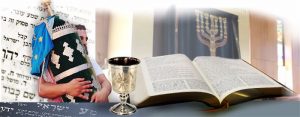The directors of Caspari Center, Elisabeth Levy and Alec Goldberg, are involved in creating a Messianic liturgy. Here, Alec answers some questions about this project.
– Why does the Messianic movement need a liturgy?
– Most of the Israeli Messianic congregations are very similar to “free” evangelical and charismatic churches, with unstructured prayers and contemporary worship. This, too, is a kind of liturgy, but over the years more and more believers have begun to see the value of a more traditional worship service, with a fixed order and prayer texts.
 – Why is this?
– Why is this?
– One reason could be the Israeli balagan (lack of order and stability) that is characteristic of many areas of our culture. With the wide-spread balagan, it is understandable that some people who are tired of it don’t want anything that even remotely resembles it in their place of worship. Another possible reason is a longing for deeper roots. Both Judaism and traditional Christianity are liturgical, and since the Messianic movement claims a unique connection to the early Jewish movement of Yeshua-believers, it would be very natural to see Messianic Jews restore the kind of liturgical service and lifestyle that characterized the first generations of Yeshua’s followers.
– What will be important in such a liturgy?
– The first important thing to say is that we are not creating the liturgy, but a liturgy. We are not a rabbinical council or a collegium of cardinals or another authoritative body, but a working group that is trying to stimulate theological thinking and offer an option which can be rejected altogether or accepted and developed further. We would like the liturgy to reflect the Jewishness of faith in Yeshua by drawing from the riches of the traditional Jewish prayers. At the same time, certain elements of Messianic worship are not present—or at least not evident—in a typical Shabbat synagogue service, and this fact will necessitate borrowing from Christian sources.
– Who will develop the liturgy? What kind of theological qualifications do the people involved have?
– The group consists of Rev. David Pileggi, the rector of Christ Church in the Old City of Jerusalem; Boaz Michael, director of First Fruits of Zion; Yoel Ben David, who serves with Jews for Jesus; Mrs. Elisabeth Levy, Caspari Center’s CEO; and myself. When Elisabeth and I discussed the candidates, Ben-David was a natural because Immanuel Church, which he attends, had previously expressed interest in having this kind of liturgy. Michael and Pileggi represent the Jewish and Christian traditions respectively. With this wonderful team, we hope that the resulting liturgy will adequately reflect the best of both.
– Where are you now in the process?
– We are just in the beginning stage and have met a couple of times.
– What role does Caspari Center play in this endeavor?
– We are facilitators who are actively involved at every stage. We hope to publish the liturgy as a brochure and to make it available to Messianic congregations worldwide.
Ingjerd Våge